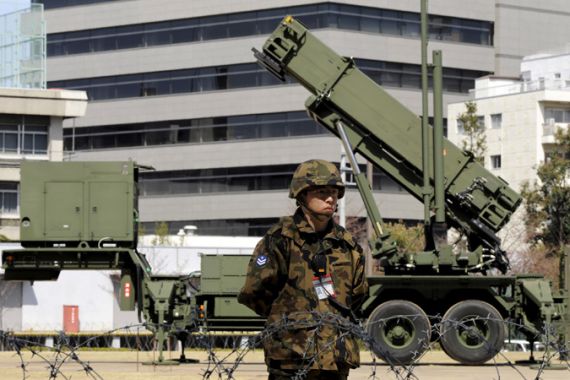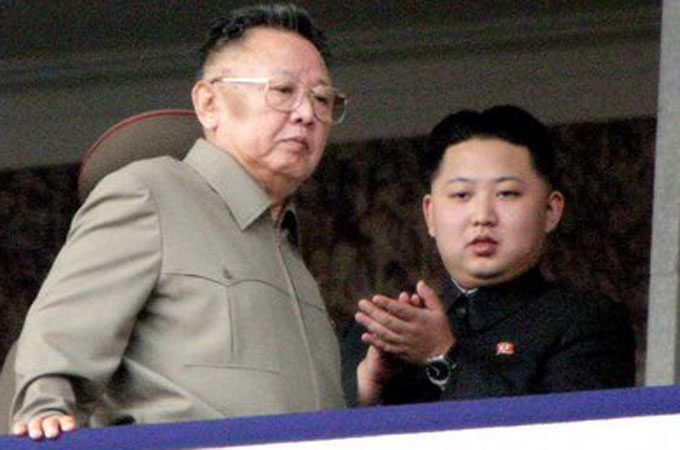Will Pyongyang stick with six-party talks?
Death of North Korean leader and succession concerns cast doubt on future of fragile nuclear disarmament negotiations.

 |
| Kim Jong-un’s first major public appearance was 65th anniversary parade of the Korean Workers Party [EPA] |
The death of North Korean leader Kim Jong-il could complicate nuclear disarmament talks with the United States and its key Asian allies, as an untested and largely unknown heir takes charge of one of the world’s most-feared atomic renegade states.
The immediate question for Washington, and close ally Seoul, is whether Kim’s isolated state can withstand a power transition to his youngest son Kim Jong-un, named by state news agency KCNA as the “Great Successor” to his father.
“It was anticipated that he was going to die soon since he looked ill and had disappeared for a while after a stroke,” said Richard Weitz, director of the Political Military Analysis at the US-based Hudson Institute.
“People here just weren’t sure when.”
Weitz told Al Jazeera that Kim was still in the process of “delicately transferring” power to his son, who is believed to be in his early 20s.
“Because the son is so young and inexperienced, we are pretty certain that a number of the North Korean generals aren’t comfortable having someone like him in charge,” said Weitz.
Obama’s challenge
The White House said President Barack Obama was in close touch with South Korea and Japan, two of the countries, along with Russia and China, engaged in six-nation talks on North Korea’s nuclear program.
|
Timeline of a nuclear threat 1989: US satellite pictures reveal a nuclear reprocessing plant at the Yongbyon complex. 1994: The US comes close to war with North Korea over its removal of spent 1998: North Korea fires its first long-range ballistic missile. 2002: US President George W. Bush names North Korea as part of an “Axis of Evil”. The 1994 accord breaks down after US accusations that the North has a secret nuclear weapons programme using enriched uranium. 2003: North Korea withdraws from the Nuclear Non-Proliferation Treaty. 2007: North Korea agrees in February to scrap its nuclear facilities in 2009: The North launches a long-range rocket in April and announces it will – Source: AFP |
“We remain committed to stability on the Korean peninsula, and to the freedom and security of our allies,” Jay Carney, White House press secretary, said in a written statement.
For Obama, Kim’s death comes as the administration weighs whether to re-engage with Pyongyang on the nuclear issue and whether to provide food aid for millions of North Koreans hard hit by shortages.
Christopher Hill, the US diplomat who led Washington’s delegation at the nuclear talks, told Al Jazeera that any further diplomatic discussion is likely to be put on hold.
“I think the North Koreans want to show a certain amount of continuity, so I don’t rule out the possibility that they will be willing to suspend their nuclear programme,” said Hill
“I think the chances are it will be slow-going in the next couple of months.”
Some believe the international community will continue to hedge its bets against a potential pullback from the talks by offering incentives to the North Korea to maintain the disarmament dialogue.
“Now, in the case of the US, there was a significant breakthrough that took place over the weekend that included exchange and agreement, the first time in four years between the two countries,” said Christine Ahn of the California-based Korea Policy Institute.
“The US agreed to send about 240,000 tons of food aid in exchange for North Korea suspending its uranium enrichment programme.”
Russia, reports Al Jazeera’s Neave Barker, is following suit.
“I think that Moscow still hopes to return North Korea to the negotiating table in some shape or form,” said Barker, reporting from Moscow.
“Russia offered North Korea the possibility of building a gas export pipeline through North Korea into South Korea, providing that it unconditionally returned to talks.”
Regional tensions
The US and its main Asian allies have resisted calls to restart the so-called “six-party” talks that broke down in 2008. United Nations inspectors were expelled from North Korea in 2009.
“China’s biggest worry will be over North Korea’s stability, and China’s aim will be to ensure the country remains stable,” said Cai Jian, a Korea expert at Shanghai’s Fudan University.
“I think security will be stepped up in North Korea, and China is also likely to tighten security along the border. If
[Kim’s] death leads to chaos, we could see a flow of refugees across the [Chinese] border.”
Some analysts said Kim’s death and the transition to an untried leader could cloud the outlook for the nuclear talks.
“Everyone’s immediate refrain is ‘Oh, great, a tyrant is gone,” said Jim Walsh, North Korea expert at the Massachusetts
Institute of Technology’s security studies program.
“But actually this is bad news, because it means we are entering a more dangerous phase in North Korean, South Korean and US relations. Naturally, North Korea is going to be on the offensive. This young leader is going to have to prove his worth.”
Last year’s sinking of a South Korean warship and shelling of a South Korean island were seen by some analysts as efforts by the younger Kim to demonstrate his leadership style, leading to fears that new provocations could strain the already tense relations with South Korea.